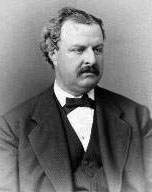
William Hulbert
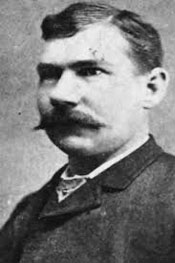
Chris Vonder Ahe

Ted Sullivan
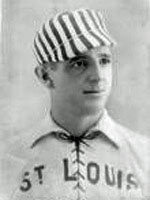
Charles Comiskey
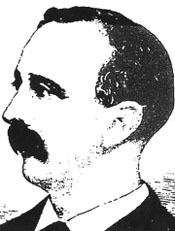
Lew Simmons

George Latham
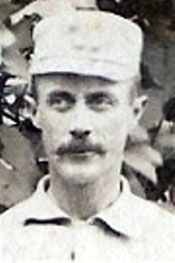
Athletics Captain Lon Knight
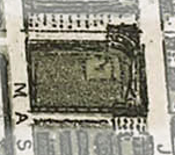
Jefferson Street Grounds on
Philadelphia map
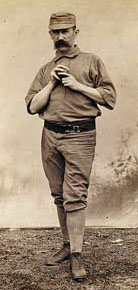
Bobby Mathews

Cub Stricker
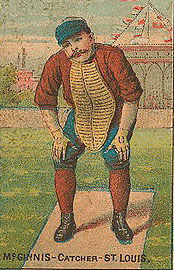
George McGinnis, pitcher
for 1883 Browns
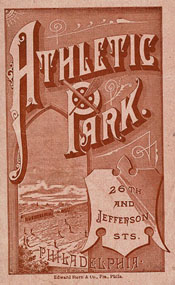
Athletic Park Scorecard 1883
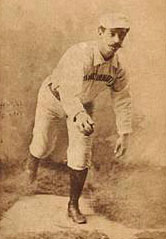
Tony Mullane
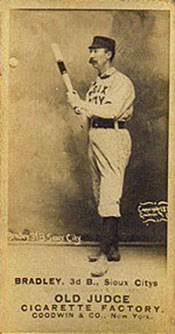
George Bradley

Fred Corey

Bob Blakiston
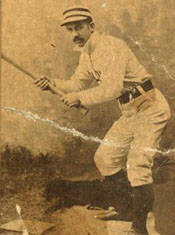
Arlie Latham
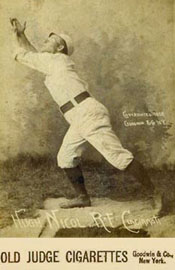
Hugh Nicol
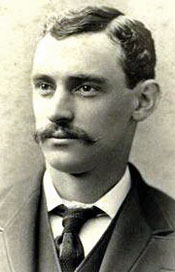
Joe Quest - easy to see why he
got so many conquests.
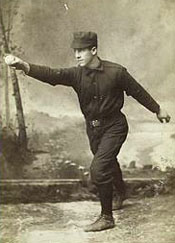
Bill Gleason
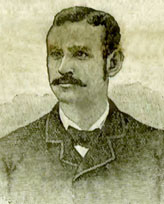
Daniel "Jumping Jack" Jones
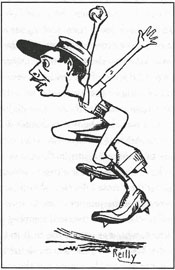
Jumping Jack as drawn by John Reilly, Cincinnati Reds player

Fred Lewis
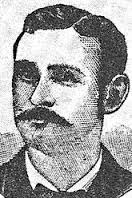
Jack O'Brien

George Strief
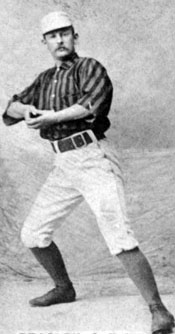
Pat Deasley
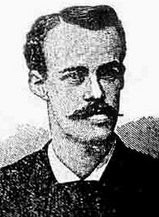
Jud Birchall

Tom Dolan

Ed Rowen
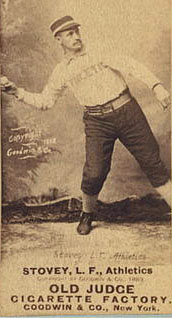
Harry Stovey

Simmons gets the better of Vonder Ahe (Philadelphia Item, September 9, 1883
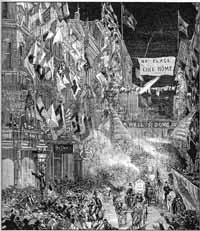
Athletics Victory Parade,
Harper's Weekly
|
September 3-6, 1883: St. Louis Browns @ Philadelphia Athletics
The St. Louis Browns came to Philadelphia trailing the Athletics by ½ game in the second pennant race of the American Association.
- The league was formed by owners of minor league and semipro teams frustrated by their inability to join the six-year-old National League.
- Baseball was on the decline across the nation because of the corruption of gambling and the rowdiness and general low-class behavior of many players.
- The Association hoped to attract a following by selling beer during games and playing on Sunday in contradistinction to the NL, which prohibited both practices. The AA owners aimed to attract working-class people whose only day off was Sunday and who wanted to enjoy a beer or two at games. The 25 cent ticket general admission was half what the National League charged as its minimum - "high enough to keep the riff-raff out," according to NL president William Hulbert. The "riff-raff" was exactly what the AA wanted at their games.
- Not only did all six teams survive the Association's inaugural season, but the league added two clubs for 1883: the New York Metropolitans and the Columbus Buckeyes. The fledgling league soundly defeated the older circuit where it counted – in attendance.
- The Association's success, due in part to signing star players away from their National League teams, forced the older league, following the death of the intransigent Hulbert, to enter into an agreement whereby all clubs in both leagues would honor the players contracts in both circuits. Also, teams could schedule exhibition games with clubs from the other league.
After his team finished fifth in 1882, St. Louis owner Chris Von der Ahe overhauled the Browns from the top down.
Von der Ahe reigned as the most colorful of the AA owners.
- A German immigrant whose fractured English regularly produced hilarious malapropisms, Chris nevertheless was a shrewd businessman who had parlayed a grocery store and saloon into a small business empire that brought in $75,000 in annual sales.
- Always trying to make more money, Von der Ahe obtained the concession rights for the Grand Avenue Park, home of the outstanding St. Louis Brown Stockings National League team from 1875-77.
- But the team resigned from the NL after a game-fixing scandal involving two of its players. The club continued as an independent organization, playing whomever they could schedule. By 1879, though, St. Louis seemed to have abandoned "base ball," as evidenced by the smattering of people who attended even the heavily advertised games.
- Von der Ahe saw a chance to earn money by making games a more exciting experience that included beer sales.
- So he bought the Browns for $1,800 and entered them into the new American Association in 1882.
Although he had little understanding of the game, Von der Ahe took an active role in running the Browns just as he did with his other businesses. The Charlie Finley or George Steinbrenner of his day, Chris constantly overruled his manager and fined, suspended, hired, and released players on a whim.
- First, he jettisoned manager Ned Cuthbert, who had kept baseball alive in St. Louis following the Brown Stockings' demise. The new skipper was Irishman Timothy Paul "Ted" Sullivan, who had led the Dubuque (IA) Rabbits to the championship of the Northwest League, acknowledged as the top minor league in the nation. The Browns' 1B Charles Comiskey, who played for Sullivan the year before, recommended his former skipper to Von der Ahe.
- With the owner's encouragement, Sullivan went after the best available players. As a result, six of the Browns' opening day starters were newcomers to the club.
- When league play began May 1, the club started slowly but soon picked up steam to move to the top of the league by mid-June.
- St. Louis continued in 1st or 2nd place through July and August into their crucial series with the Athletics.
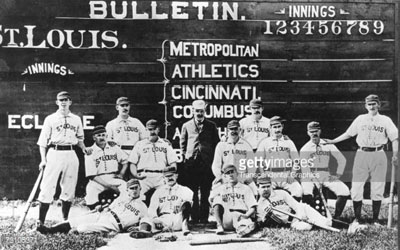
1883 St. Louis Browns with their owner New faces also improved the A's.
Athletics owner Lew Simmons, while not as colorful as Von der Ahe, had an interesting background of his own.
- He had made his fortune as an entertainer, chiefly in minstrel shows and as a composer of hit songs.
- During warm weather, when theaters shut down, Lew enjoyed played baseball and was good enough to take the field for the old Philadelphia Athletics right after the Civil War.
- As in St. Louis, baseball in Philadelphia withered in the late 1870s to the point where the city lost its berth in the National League.
- In 1881, Simmons joined two others in an attempt to revive the Athletics. The team's games drew enthusiastic crowds and led to a place in the new American Association.
- After the club made $22,000 in profits in '82, Simmons dropped his minstrel work to devote his full attention to his club, serving as business manager (precursor of today's general manager).
- Following the same blueprint that worked in St. Louis, Simmons replaced player-manager Captain George "Jumbo" Latham, despite his third-place finish in '82, with Lon Knight, who played OF. (Knight is listed as manager in Baseball-Reference.com but was actually the captain, with Simmons handling personnel matters.)
Knight had been born in Philadelphia as Alonzo Letti. After his father died when Alonzo was nine, he was sent to a private school for fatherless boys. There his name was changed to Knight, possibly because of the ethnic hostility against Italians.
- While the A's didn't undergo as much of a makeover as the Browns, Philly fans needed a scorecard to recognize some of their starters on opening day.
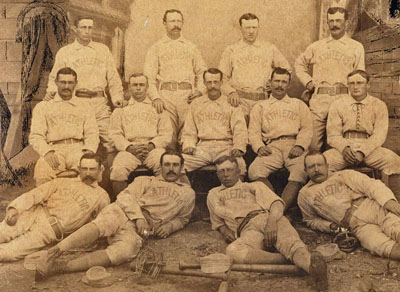 |
1883 Philadelphia Athletics
L-R 1st row: Bobby Mathews, John O'Brien, Fred Corey, Ed Rowen
2nd row:
Bob Blackiston, Cub Stricker, Jud Birchall, Bill Crowley, Jersey Bakley
3rd row: Harry Stovey, George Bradley, Mike Moynahan, Captain Lon Knight
|
They did so in a brand new ballpark on the "Jefferson Street Grounds."
- Home to the old Athletics from 1864-77, the site had fallen into disrepair.
- Strategically located at an intersection served by five horsecar lines, the park boasted a new grandstand "handsomely ornamented with fancy cornicework" and featuring 1,600 arm-chairs. A press box with room for 12 reporters sat on the upper deck along with 32 private boxes, each seating five.
- Altogether, the park seated 6,000.
Philadelphia started the season with a bang.
- They won 17 of their first 19 to open a 4.5 game lead.
- No one can keep up that pace, and a five-game losing streak brought them back to the pack.
- Still, they stayed in 1st or 2nd place through the summer.
The AA standings on Monday, September 3, the start of the crucial four-game series between the frontrunners, looked like this.
| Team |
W |
L |
% |
GB |
| Philadelphia |
55 |
25 |
.688 |
-- |
| St. Louis |
55 |
26 |
.679 |
1/2 |
- Typically for so late a date in a grueling season, neither team would compete at full strength.
- The A's biggest problem was the health of ace pitcher Bobby Mathews, who usually pitched every other game. In addition to his dead arm, Bobby's ankle, hurt recently while running the bases, was so sore he could barely walk much less push off to gain maximum velocity on his pitches. To make matters worse, he had wrenched his back. Pains shot through his body if he moved the wrong way.
- Another question mark for the home team was 2B Cub Stricker, who had been hit in the face during batting practice two days earlier. Short several teeth, Cub pronounced himself ready to go for the big series.
The Browns didn't suffer from the loss of a player but rather from the abrupt resignation of their manager.
- Disgusted with continuing reports that his players were carousing through the night and even getting in trouble with the law on road trips, Von der Ahe decided he need to oversee the team personally. So he joined the club in New York for that series before the visit to Philadelphia.
- Chris had been clashing off and on all season with Sullivan over his lax discipline. The owner had fined players for offenses ranging from being overweight to drunkenness to being thrown out at home plate on a double steal.
- During the second game of the series with the Metropolitans at the Polo Grounds, Von der Ahe ordered Sullivan to remove "fat" P George "Jumbo" McGinnis after he surrendered three runs in the 1st. Wanting to save his other starter for the next day, Ted ignored the orders.
- Late that evening, Chris confronted Sullivan, warning him to shape up. When Ted pointed out that he had turned the club into a contender, Von der Ahe dismissed the idea, claiming that he had to do most of the managing himself.
- Finally, Sully could stand it no longer and demanded release from his contract, telling Von der Ahe to run the club himself. Furious, Chris granted his manager's wish.
- After the owner cooled off, he realized he had made a big mistake. He pleaded with Sullivan to return but was rebuffed.
- So Von der Ahe announced that he would manage the team himself and enforce discipline. However, he had enought sense to turn over the day-today leadership to Comiskey.
- The Browns won the last two games in New York to pull into a tie with the A's. However, Philly won a game over the weekend while the Browns were idle to edge in front by a half-game.
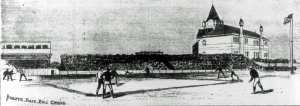
Jefferson Street Grounds The onslaught of people trying to enter the ballpark for the Monday game surprised A's personnel.
Eventually, the game started 15 minutes late.
- "Play ball!" filled the air from the lone umpire, working behind the plate in his double breasted blue coat and military cap trimmed with gold cord and buttons, a "railroad conductor's uniform," as many dubbed it.
Since one man could see only so much, many players took advantage of the situation to cheat while the umpire looked elsewhere.
- Common tricks involved a fielder tripping or holding a base runner and a runner cutting across from first base to third or from second to home.
- Owners put up with these shenanigans because they didn't want to pay for a second umpire. It took nearly thirty more years for the major leagues to expand to two-man crews.
- The American Association pioneered the idea of an umpiring staff, hiring four men to work all the games.
- Previously, the home team selected and paid the umpire – an obvious conflict of interest.
- Each AA arbiter made $120 a month plus travel expenses. However, each man had to supply his own uniform.
- The Browns, despite their name, took the field wearing scarlet caps and socks and scarlet trim on their gray road uniforms.
The brown stockings and caps returned the next season, the red apparel forgotten until the team morphed into the Cardinals at the turn of the century.
- Tony Mullane strode to the box for St. Louis and set the A's down in order.
The pitcher's mound had not been invented yet.
- In an attempt to increase hitting, the front edge of the pitcher's box had been moved back 5' in 1881, to 50' from home plate.
- With no pitching rubber, the hurler could start anywhere in the 5' square box he wished as long as he delivered the ball inside the box.
- The rules required pitchers to release the ball below their shoulders. However, many hurlers violated the rule with impunity, particularly in their home ballparks where the sole umpire could be intimidated by rowdy fans.
- The following season, pitchers were allowed to release the ball anywhere they wished.
- With Mathews still too weak to pitch, veteran George Bradley threw a 1-2-3 first inning. Read the story of Bradley's controversial signing by the A's.
- The home team took the lead in the top of the 2nd on a single by Fred Corey, who manned 3B when Bradley pitched. Fred promptly stole 2nd and went to 3rd when the throw was muffed. Bob Blakiston blooped an RBI single just inside the RF foul line.
- But St. Louis responded with two in the bottom of the inning. 3B Arlie Latham doubled and scored when 2B Hugh Nicol singled and took second on the throw in. A ground out and wild pitch made it 2-1.
A newcomer to the Browns, the 5'4" Nicol quickly became a fan favorite because his size approximated theirs .
- The A's bats came alive in the 4th. Knight doubled, and Mike Moynahan and Corey followed with singles. Several passed balls resulted in a total of three runs.
Passed balls happened frequently – as did broken fingers - when catchers used only their bare hands.
- The Browns cut the lead in half in the bottom of the inning on three errors and a wild pitch.
- But Philly got the run right back in the 5th on two errors and a groundout. Mullane shut the door at that point, allowing no hits the rest of the way.
Using their trademark aggressive base running, the Browns scored four runs in the last three innings to pull out the victory.
- Two errors preceded 2B Joe Quest's hit for a run in the 6th.
Quest had been Sullivan's last acquisition before his resignation. The speedy 5'6" pepperpot had been an outstanding 2B for the Chicago White Stockings but had declined in 1883 thanks, many believed, to an ugly scandal.
- A handsome, witty fellow with impeccable taste in clothes, Joe earned a reputation as one of baseball's top womanizers.
- One of his conquests was a Mrs. Waters, who shared the same boardinghouse with Quest in Chicago. In November, 1982, her husband shot himself in the chest, supposedly because of his wife's infidelity.
- Reporters quickly identified the ballplayer as the target of Mrs. Waters infatuation. They learned that she had attended White Sox games throughout the summer and was frequently seen on dates with him.
- It took her four days to arrive at her husband's bedside from Boston.
The White Sox sold Quest to Detroit in the off-season. He hit .234 in 37 games for the Wolverines before moving to the Browns.
- Mullane helped his own cause with a double in the 7th, scoring on a two- base error. That runner hurried home on SS Bill Gleason's hit to put the Browns up 6-5.
One of Sullivan's Dubuque players, Gleason played a give-no-quarter-ask-no-quarter brand of ball epitomized by two incidents that caused an uproar in 1882.
- Attempting to score, Bill slammed into A's C Jack O'Brien, knocking the backstop senseless.
- In another home plate collision, Gleason broke the wrist of Cincinnati C Phil Powers.
- Latham's second double and a throwing error produced an insurance run in the 8th as the Browns took over first place by a half game to the great pleasure of their owner, wearing his usual three-piece suit and derby while puffing on cigars in his box seat.
Latham was one of Von der Ahe's favorites. Dot poy Latham … can run like a cantelope.
- A fine all-around player, Arlie had a reputation for heckling opponents to throw them off their game.
- If, according to The Sporting News, Comiskey was the "head" of the Browns, then Latham was their "mouth."
- Arlie also did a dead-on imitation of his owner's swaggering walk.
- Seven errors by the gloveless fielders (four by the A's) caused five of the afternoon's eight runs to be unearned.
With Mathews still unable to function, Simmons, out of desperation, acquired a pitcher straight out of college.
- He signed 22-year-old Daniel Albion Jones, Jr.
Jones had been the hurler for Yale's Ivy League champions.
- Needing money for law school, he offered himself to the highest bidder when his college season ended.
- Fortunate to be part of a seller's market, he accepted Detroit's astounding offer of $625/month. ($400/month was considered a top salary in those days.)
- He won 6 and lost 5 during the summer, not enough to justify his lavish salary. When Detroit released him, Simmons offered $500/month.
- After the Athletics failed to score in the top of the 1st, Jones took the mound before another big crowd, with a similar number of standees and fence hangers as the day before.
- The throng quickly learned why Jones had been nicknamed "Jumping Jack" during his sojourn out west. Occasionally, usually with two strikes on the batter, Jones would jump as he delivered the ball, flinging his arms and his legs out.
- The A's broke the ice in the top of the 2nd on two singles around a passed ball.
- Philly blew it open with five in the 4th off Mullane, gamely pitching for the second day in a row. The ledger showed a triple, two doubles, a single, a missed throw by Comiskey at 1B, and a two-run deep flyout.
- Mullane struck out the first two batters in the 6th but both reached base when the C couldn't corral the third strike. That opened the gates for four more tallies. The Browns added a wild throw, a ball through the SS's legs, and a muffed fly.
- Meanwhile, "Jones proved a terror to St. Louis." He gave up only four hits and finished with a flourish by retiring the last twelve hitters in order.
- In the 8th, the ecstatic crowd began whistling the "Dead March" in unison, as was their habit regardless of which team led at that point.
- When Jones finished the 11-1 rout with a flourish, striking out the last batter, the fans threw their derbies into the air, jumped onto the field, and hoisted the rookie P on their shoulders to celebrate the A's regaining the top perch, 11-1.
From the heights of elation the day before, Von der Ahe sank to the depths of frustration after Game 2.
- Furious, he ordered the team to meet in his hotel room. "Vhy did you loose dot game today?" he demanded.
- "Devilish hard luck," said Latham as the others nodded in agreement.
- Suddenly a smile crossed Chris's face. "Vell, boys, if it was hard luck, dot settles it. You can't win a game ven you have hard luck."
- The relieved players shook their owner's hand and left.
Captain Knight decided to try Jones again the next day before a third straight sellout crowd of 11,000 who saw "the most exciting game played in this city this season" (according to the Philadelphia Star).
- The ushers allowed no one on the field. Every inch of standing room space, both in the grandstand and in front of the field seats, was occupied.
- The tired youngster was not nearly as intimidating as "his prance showed little of the pristine vigor that reduced the temperatures for St. Louis the day before." Still, he performed far better than any other hurler Knight could summon.
- Comiskey went with McGinnis, whom Von der Ahe had suspended for a week in July for "not taking care of himself."
At 5'10" and just a biscuit or two short of 200 lbs, Jumbo had won 25 games for the Browns in '82. Many considered him, along with Bobby Mathews, as the two best pitchers in the Association.
- Batting first again, the A's scored an unearned run without a hit in the top of the 1st.
- Jones made that stand up until the 4th. He started the inning by grabbing a hot liner back at him off the bat of Fred Lewis. But with two outs, Latham walked, Jones's first free pass in two games. Nicol hit a pop up that should have retired the side, but SS Corey dropped the ball allowing Latham to score.
Lewis, acquired from the last place Phillies of the National League, brought with him a reputation as "an arrogant, dull-witted, barrel-chested" lush. But he could hit the ball hard, and that's why Sullivan purchased the outfielder.
- Philly went back in front with two in the 5th, but the Browns came back with one in the 6th, driven in by Lewis's first hit of the series, and an unearned tally in the 7th to knot the count again.
- But the Athletics jumped back in front in the 8th. Corey smacked a double to drive home O'Brien, who had walked - no mean feat when it required eight balls. With two outs, Bradley singled home what would prove to be an essential insurance run.
- The bottom of the 8th ended with Comiskey being thrown out trying to score on a base hit.
A fine running catch by George Strief in LF and a "difficult foul tip" held by C Pat Deasley retired the A's in the 9th and set the stage for an exciting finish.
Deasley, another of Sullivan's off-season acquisitions, had made his reputation by playing 38 consecutive games with two broken fingers for the Boston Red Stockings of the NL in '82 – an achievement made all the remarkable when you consider that players didn't wear gloves yet.
- Nicol hit Jones's first pitch for a single, then advanced to 2nd and 3rd on passed balls.
- Quest popped into short CF where Stricker made the catch "after a long backward run, but tripped and fell as his fingers closed on the ball." That allowed Nicol to score. 5-4 A's
- The crowd alternated between "deathlike silence" and "noisy shouts" as their emotions ebbed and flowed.
- McGinnis poled a drive deep to LF. Jud Birchall raced after the ball and, a few feet from the fence, turned and, looking directly into the sun, made the catch with his bare hands.
- The A's appeared to have the game won when Tom Dolan popped the ball high in front of home plate. C O'Brien and P Jones both went for it. It was clearly Jones' ball, but he seemed loath to try for it, motioning for O'Brien to take it. O'Brien tried hard and got his hand on the ball but could not hold it. (Philadelphia Star)
- Strief hit a grounder past Jones over 2B to advance the tying run to 2nd and put the winning run on 1st.
- Needing only a single to deadlock the game, Gleason smashed the ball to "Grin" Bradley at the hot corner. With no time to think, he reflexively snagged the ball and stepped on his base to force Dolan and propel the A's to a 1½ game lead over the Browns.
Before resuming his studies, Jones completed all seven of his starts for the A's, winning five. However, he abandoned his jumping jack deliveries, to the chagrin of the crowds who came to see it. He never pitched again in the majors after that season.
The Thursday finale drew the biggest crowd of the series.
- 13,500 tickets were collected with another 1,500 or so in attendance as well. Thousands lined up before the gates opened to claim the best seats. As usual, several hundred clambered to the top of the outfield fence for a better view.
- Police strung ropes down the foul lines and across the outfield to keep the overflow away from the players.
- Several hundred jumped the fence in a remote corner of the grounds to view the game without paying admission.
The Browns could still leave the City of Brotherly Love with a split before returning to St. Louis for the remainder of their 100-game schedule.
- The A's lost the toss for the fourth straight day and took the first lead as they had done in the three previous games. With Mullane back in the box, leadoff man Birchard reached on 3B Latham's error, then stole second. A single and a throwing error produced the initial tally, and another single sent home run #2.
Mullane, another of the many Irish players, had won thirty games for Louisville in 1882.
- But a club paid a price for his talent as he was known to be a prima donna.
- Hitters had to contend with a blazing fastball and a sharp curve, thrown illegally over his shoulder. If necessary, he could pitch left-handed as well as right.
- The part of his repertoire, though, that gained him the most notoriety was his viciousness in attacking hitters – literally. If a man crowded the plate on him, Tony thought nothing of firing the ball right at him since the rules did not yet award a hit batsman first base.
- Many were the men Mullane put out of action for extended periods of time. In the crucial series against the Athletics, however, he was on his best behavior.
- Bradley resumed the pitching chores for Philadelphia. The Browns got to him for a run in the 2nd. Nicol grounded a one-out single through the 3B hole, stole 2nd, and took another base on the wild throw. Quest's one-base hit brought him home.
- Philly got that run back in the 4th. It started with a two out fumble by Quest on Corey's grounder. Showing the Browns his side could run too, Fred stole 2nd and took 3rd on a passed ball. Ed Rowen's clutch single to CF plated the run.
The Athletics had signed Rowen in the off-season for one reason: He had been Bobby Mathews' C in Boston in '82, and Simmons wanted to make his new hurler as comfortable as possible. Ed was playing in the fourth game of the series to give Jack O'Brien a much needed, well deserved rest. An RBI from the backup in a crucial game was a bonus.
The visitors pecked away at the lead in the 5th and 6th.
- Mullane scored after singling, continuing to 2nd on a wild throw, advancing to 3rd on a ground out, and trotting home on a fly ball.
- The Browns tied the game without a hit on Monahan's fumble, a steal, a passed ball, and a missed grounder by Corey.
Once again, the resilient Athletics took the lead right back.
- Redeeming himself for his error, Corey opened the 7th with a ringing double. But it appeared he would die at 2nd after Rowen popped out and Bradley flew out.
- But Stricker came through with a double down the LF line. 4-3 A's
Several fine fielding plays helped put goose eggs on the board for the A's in the 8th and 9th.
- However, the Browns could do nothing against Bradley and, for the second game in a row, trailed heading into the bottom of the 9th.
- Corey made a great stop on Quest's grounder and threw him out at 1st.
- Deasley excited the small St. Louis contingent when he rapped a single to LF and moved to 2nd on a passed ball.
- Mullane skied to LF, but Birchall muffed the catch "most ingloriously." Deasley wisely held 2nd.
- With the crowd silent as if in church, Strief stepped in next and hit the 1-0 pitch on the nose toward the RF fence. Deasley set sail for home while Mullane paused halfway to 2nd. Knight turned and ran with the ball a few steps, and then turning, sprang up and caught it with both hands as it was passing over his head, and threw accurately to Stovey. Mullane got back to 1st in time, but Deasley, who had passed 3rd, was doubled off on Harry Stovey's throw to Stricker. Just like that, the game ended.
- The shout raised was instantaneous and deafening, and in the twinkling of an eye two or three thousand person were swarming over the field and diamond. Knight was surrounded, and hustled along toward the dressing room entrance, the excited throng waving hats and cheering lustily.
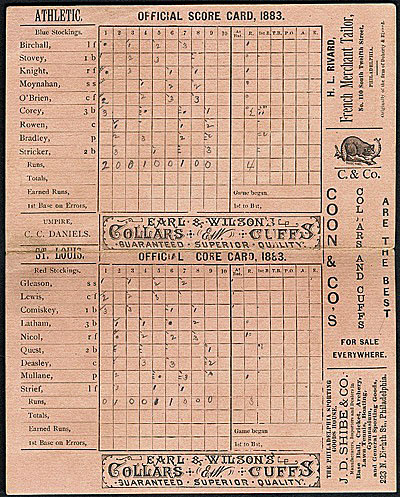
Scorecard for the Athletics' 4-3 win over the Browns. Note that, in the excitement, the person failed to record the game-ending double play. With the A's now 2½ games in front, the Philadelphia papers exulted as if the pennant race were over. ST. LOUIS SURRENDERS, shouted the Philadelphia Press, adding St. Louis has gone Westward in sackcloth and ashes.
But Von der Ahe had no intention of surrendering.
- In an interview with a favored reporter (who reworded his comments in the king's English) after returning to St. Louis, Chris was surprisingly sanguine about his club's chances. He blamed the one-run loss in Game 3 of the big series to his team's poor base running. Just when the boys ought to have kept a cool head, they became over anxious. We outplayed the Athletics at every point and the game should have been ours.
- He credited the final defeat to umpire Charlie Daniels. We again outplayed them everywhere, but they managed to work in their bull-headed luck and capture a game, which in every respect was rightfully ours. Daniels gave us the worst of it on close decisions.
- The owner concluded: I wouldn't give our position for theirs. We have no more Cincinnati and (Louisville) Eclipse games, and they play both of these clubs away from home.
- Unless the writer was putting ideas as well as polished prose in his mouth (which he probably was), Von der Ahe, for all his supposed ignorance of the game, assessed his club's situation quite well.
Post-script
The Browns took advantage of Home Sweet Home.
- They returned to their winning ways by taking three of four from the lowly Baltimore Orioles. St. Louis won nine and lost four on their end-of-season homestand.
- But the Athletics, despite injuries and exhaustion in the pitching staff, withstood the pressure by winning seven of thirteen on their road trip. The key was taking two-of-three in St. Louis September 21-23.
- Despite losing three of four at Louisville to end the season (with the only victory being recorded by The Jumping Jack), the A's copped the pennant by a single game.
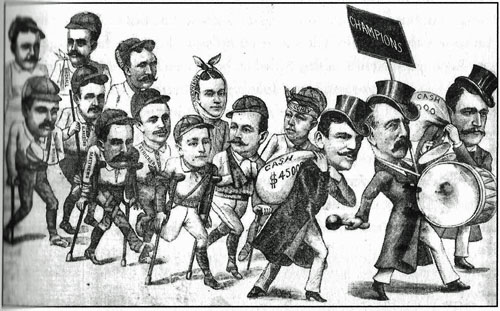
Cartoon depicting the injured Athletics, led by Simmons with the bass drum,
limping home with the 1883 American Association pennant.
- That meant that, if the Browns had come from behind in either of the two contests in which they failed to bring home the tying run in the bottom of the 9th at Athletics Park, they would have taken the crown.
Reference: Achorn, Edward, The Summer of Beer and Whiskey: How Brewers, Barkeeps, Rowdies, Immigrants, and a Wild Pennant Fight Made Baseball America's Game (2013) |
|